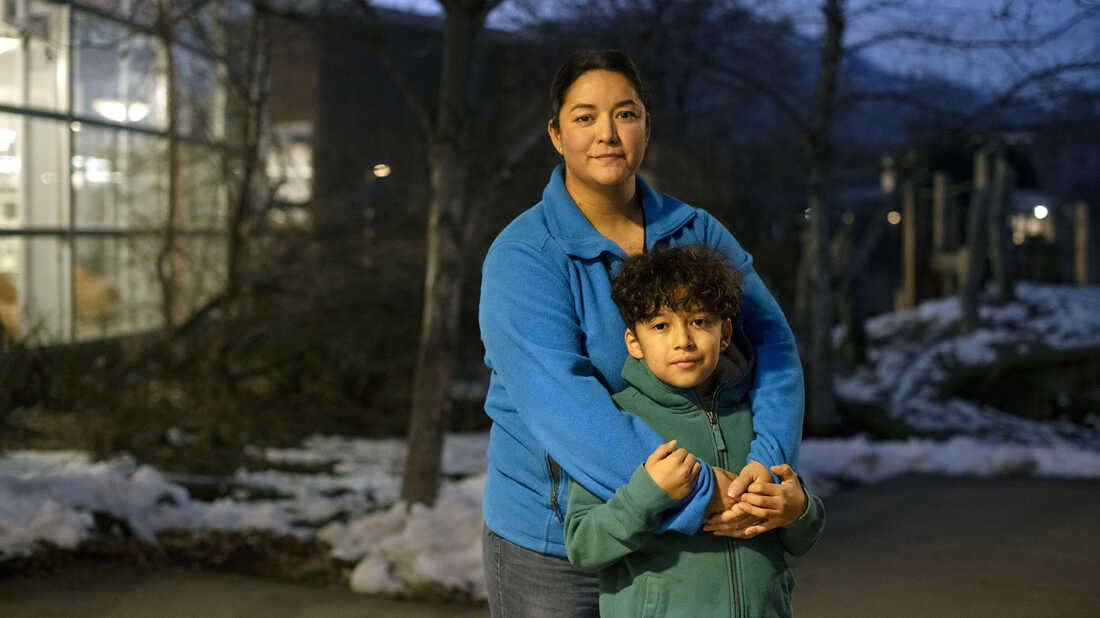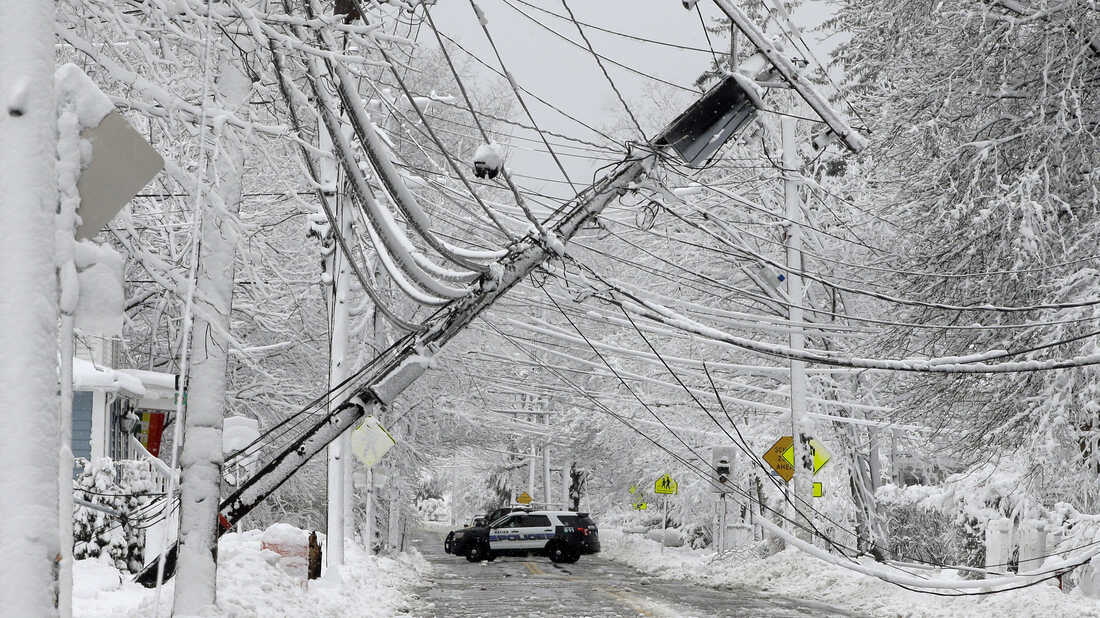Good morning. You’re reading the Up First newsletter. Subscribe here to get it delivered to your inbox, and listen to the Up First podcast for all the news you need to start your day.
Today’s top stories
NPR’s senior political editor/correspondent Domenico Montanaro joins the newsletter today:
And the result was… what everyone pretty much expected. Former President Donald Trump won in a landslide. So, what does it all mean? Here are five takeaways:

Former President Donald Trump speaks at his caucus night event at the Iowa Events Center on January 15, 2024 in Des Moines, Iowa.
Chip Somodevilla/Getty Images
hide caption
toggle caption
Chip Somodevilla/Getty Images

Former President Donald Trump speaks at his caucus night event at the Iowa Events Center on January 15, 2024 in Des Moines, Iowa.
Chip Somodevilla/Getty Images
- Republicans have been saying they’re still with Trump. Believe them. Trump won by 30 points and with more than 50% of the vote.
- Trump’s criminal indictments have only helped him – at least with the GOP base. Two-thirds of Iowa Republicans said they think he’s fit to be president even if convicted.
- DeSantis will interpret his second-place finish as a reason to keep on going, but a path to the nomination for him looks closed off. He spent millions, and his support only went down.
- The stakes for Haley in New Hampshire just went up. She needs to prove she can give Trump a run for his money with a more moderate electorate.
- Caucuses just don’t feature high participation. Almost $124 million was spent on campaign ads in Iowa. Just over 110,000 people caucused, or $1,124 per person.
Stay informed during the 2024 election season and beyond by subscribing to the NPR Politics newsletter and listening to the NPR Politics podcast.
On Up First this morning, reporters from NPR and the network break down the results:
- The subzero temperatures brought down turnout, NPR’s Don Gonyea reports from Des Moines. But he says “there’s no sense” more voters would have changed the results. Former U.N. Ambassador Nikki Haley finished just behind DeSantis. Vivek Ramaswamy, who finished fourth, suspended his campaign and endorsed Trump.
- Iowa Public Radio’s Sheila Brummer notes that Democrats also held caucuses last night, but votes were mailed in, and the results won’t be announced until Super Tuesday on March 5. In 2022, the DNC elevated South Carolina to the first spot in its primary calendar.
- Haley has heavily courted New Hampshire’s independent voters. The state holds its primary on Jan. 23. New Hampshire Public Radio’s Josh Rogers says Independents make up the bulk of the electorate in his state. The economy, inflation, the cost of housing, immigration and foreign policy are among the top issues for voters here.
On Morning Edition, NPR’s Steve Inskeep and Michel Martin speak to experts about the importance of young voters and independents.
- Jack Lobel, a spokesperson at the Democrat-aligned group Voters of Tomorrow, a nonprofit seeking to mobilize Gen Z voters, notes that only 9% of Iowa caucusgoers were under 30. He says the GOP is campaigning on issues that are unpopular with young voters, which could be a bad sign for them come November.
- Lisa D. T. Rice is an independent political strategist and board member of Unite America, an organization that advocates for electoral reforms. She says independent voters are “the ones in it for the democracy” and don’t think a third party is necessary. They’re looking for “someone who will represent a broader swath of the electorate” and are “ready to vote.”
Stay tuned for more analysis and reactions from the Iowa caucus on NPR’s live blog.
Living better

Maribel Martinez and her son, Ivan Monreal-Martinez, 9, at the Boulder Public Library on the night of the December coupon distribution for the Fruit & Veg program.
Rachel Woolf/Rachel Woolf for NPR
hide caption
toggle caption
Rachel Woolf/Rachel Woolf for NPR

Maribel Martinez and her son, Ivan Monreal-Martinez, 9, at the Boulder Public Library on the night of the December coupon distribution for the Fruit & Veg program.
Rachel Woolf/Rachel Woolf for NPR
Living Better is a special series about what it takes to stay healthy in America.
Fresh fruits and vegetables can be expensive. Many people don’t qualify for federal food assistance — including undocumented people. In Boulder, Colo., officials established Fruit and Veg Boulder, a nutrition incentive program that gives families coupons for fruits and vegetables three times a month. The initiative is funded by a local soda tax, which gives the added benefit of making unhealthy food less appealing.
Listen to how the program has helped fill gaps in the federal SNAP program and changed residents’ lives. You can read the full story here.
Life advice

To prepare for a potential power outage, make sure you have backup power sources and an emergency plan in the event of a prolonged blackout, say experts.
Steven Senne/AP
hide caption
toggle caption
Steven Senne/AP

To prepare for a potential power outage, make sure you have backup power sources and an emergency plan in the event of a prolonged blackout, say experts.
Steven Senne/AP
Many areas of the U.S. are still facing dangerously cold temperatures. Schools in Chicago, New York and parts of the South have closed. Big winter storms can cause power grid outages that cause homes to lose heat, electricity or water. These practical actions can help you stay prepared in an outage:
- Know your proximity to essential services like hospitals, which have “priority” access to power.
- Keep a backup power source for medical devices, medications that require temperature control and cell phones. A car battery inverter can turn your car into a power source.
- Stock up on water and nonperishable foods.
- Use power strips with surge protection. When electricity comes back, surges can damage your appliances.
3 things to know before you go

From left to right: Christopher Storer, Joanna Calo, Ayo Edebiri, Matty Matheson, Jeremy Allen White, Tyson Bidner, Edwin Lee Gibson, Liza Colón-Zayas, Oliver Platt, and Ebon Moss-Bachrach accept the Outstanding Comedy Series award for The Bear onstage during the 2024 Emmys.
Kevin Winter/Getty Images
hide caption
toggle caption
Kevin Winter/Getty Images

From left to right: Christopher Storer, Joanna Calo, Ayo Edebiri, Matty Matheson, Jeremy Allen White, Tyson Bidner, Edwin Lee Gibson, Liza Colón-Zayas, Oliver Platt, and Ebon Moss-Bachrach accept the Outstanding Comedy Series award for The Bear onstage during the 2024 Emmys.
Kevin Winter/Getty Images
- The Iowa caucuses were not the only event with few surprises last night. Most of the frontrunners took home Emmys at the delayed ceremony. Read the complete list of winners, see the best red carpet looks and read six takeaways from the show.
- For the second time in a month, a volcanic eruption in southwestern Iceland sent lava into a nearby town, engulfing homes and causing evacuations.
- When Justin Horner’s tire blew out on a busy freeway in Portland, Ore., a Spanish-speaking family came to his aid. The father’s empathetic motto, “Today you, tomorrow me,” touched Horner and went viral online, making him an unsung hero.
This newsletter was edited by Majd Al-Waheidi.



